
by Melanie Oda (Japan) | Apr 17, 2015 | 2015, Awareness, Cooking, Cultural Differences, Culture, Domesticity, Expat Life, Eye on Culture, Family, Food, Health, Home, Identity, International, Japan, Life, Life Balance, Living Abroad, Maternal Health, Me-Time, Motherhood, Multicultural, SAHM, Social Equality, Stress, Time, Traditions, Womanhood, World Motherhood
 I start my morning here in Japan the same way every day: by cleaning out the drain trap.
I start my morning here in Japan the same way every day: by cleaning out the drain trap.
Not very pretty, I suppose, but I’ve learned the hard way that it needs to be done frequently and well. The drain traps here in Japan are metal mesh to prevent food from going down the drain. They get gross very quickly.
I’m pretty sure I started out my days when I lived in the US with a cup of coffee, which seems quite glamorous by comparison!
In spite of our gains in education or employment opportunities over the last century, much of our time as women gets taken up by mundane household tasks like this. Women all around the world are doing the same kind of things: laundry, food preparation, cleaning, child care, though in very different ways.
It makes me curious. How much of your time gets spent on “daily chores?” What kinds of things do you need to do every day? Do you do them alone, or do you have help?
Perhaps it is a boring topic, but for comparison I thought I would share a little bit of what housework is like here in Japan.
Laundry gets done daily in most families. We have washing machines, but most people don’t have dryers. In a country with cold winters, humid summers, and a rainy season, keeping up with the laundry feels like a daily battle! When the weather is not cooperative, laundry gets hung from curtain rails or any other overhang that can be found indoors. We have to bob and weave our way around the house. Imagine that Catherine Zeta Jones movie, but with laundry instead of lasers.
I do the shopping most days as well. This is quite common here in the greater Tokyo area, where storage space is limited and many people do not have cars to allow buying in bulk. Milk is sold by the liter; laundry detergent in 500ml bottles. The biggest shopping challenge is buying rice, which comes in 5 or 10kg bags.
I need to dust and vacuum every day. This is much more often than we did in the US growing up. I’m not sure why Japan is so dusty. Could it be the tatami floors? The single pane windows? The small living space? And more important than why, how can I make this dust accumulation stop?
Japanese cuisine seems to be gaining in popularity around the world. Many Japanese people eat a full meal in the morning (though this is slowly changing,) as well as at lunch and dinner. Japanese bento are also getting a lot of attention on the Internet for being nutritious as well as visually appealing. Overwhelmingly, the cooking is done by women. (Personally, since my children’s lunch is provided by the school, most days I cook twice.)
Like most families here, we have a gas stove-top, a rice cooker, and a microwave combined with an electric oven for cooking. My mother-in-law has a separate gas burner that can be placed on the table for doing things like sukiyaki or okonomiyaki, foods that are consumed as soon as they are cooked by the family from the same dish. My children are still a bit too small for me to attempt this at home.
I think many of us around the world are doing these same things, but the nitty-gritty of how we get it done and how often we do it are different. I can’t help but wonder what housework says about the values of the culture.
In the US, for example, many families take pride in a well-decorated home. In Japan that is much less important. (Perhaps because many women are spending all that time dusting and dodging laundry….)
What kinds of things are included in your daily duties? How do you feel about doing them?
This is an original post to World Moms Blog from our writer in Japan and mother of two, Melanie Oda.
The image used in this post is attributed to the author.
If you ask Melanie Oda where she is from, she will answer "Georgia." (Unless you ask her in Japanese. Then she will say "America.") It sounds nice, and it's a one-word answer, which is what most people expect. The truth is more complex. She moved around several small towns in the south growing up. Such is life when your father is a Southern Baptist preacher of the hellfire and brimstone variety.
She came to Japan in 2000 as an assistant language teacher, and has never managed to leave. She currently resides in Yokohama, on the outskirts of Tokyo (but please don't tell anyone she described it that way! Citizens of Yokohama have a lot of pride). No one is more surprised to find her here, married to a Japanese man and with two bilingual children (aged four and seven), than herself. And possibly her mother.
You can read more about her misadventures in Asia on her blog, HamakkoMommy.
More Posts

by Aisha Yesufu | Apr 14, 2015 | 2015, Africa, Awareness, Education, Girl Child, Girls, Global Citizenship, Government, Grief, Human Rights, Humanitarian, International, News, Nigeria, World Moms Blog, World Voice
365DaysOn the Chibok Girls are never to be forgotten.

It is 365 days today that the Chibok Girls were abducted. Exactly one year ago on 14th April 2014 276 Chibok School Girls were abducted from their school. I just cannot believe the fact that we actually allowed it to get to one year without the rescue of our #chibokGirls. How could we allow innocent children be taken away by terrorist group and do nothing. The #ChibokGirls ought not to have been taken in the first place. They were supposed to be protected to enjoy their Childhood and their innocence. We failed to protect them and also failed in the next best thing which would have been their immediate rescue. How can we live with ourselves? How do we live with our consciences? How do we face ourselves in the mirror knowing fully well that we abandoned 219 #ChibokGirls and left them with the terrorists.
What is the crime of #ChibokGirls? Is it because she is Nigerian? Is it because she is poor? Or is it because she dared to be educated? #ChibokGirls against all odds dared to be educated and on April 14th 2014 they paid for daring. A group of armed terrorists entered their school and abducted 276 of them from their school in Chibok. 57 of them escaped on their own and there are still 219 of them still with the abductors for a year today, and not a single one has been rescued. The armed terrorists group known as Boko Haram, literarily meaning that western education is forbidden, have vowed to get schools closed down and seem to be succeeding. For some children in the North Eastern States of Nigeria education has become truly forbidden as schools in some parts have been closed for over a year.

The #ChibokGirls were writing their Final year examination after which those who passed would be able to secure admission into University. A beacon of hope for their families. Schools had been closed down in neighbouring towns and a lot of parents sent their children to be able to complete their secondary school education in Chibok.
There had been series of attacks within some neighbouring villages and yet the #ChibokGirls went to school. Even those who were not boarders went to stay in school because there was electricity there and they wanted to have a place to read for their exams. Sheer determination to get an education which they knew would be their key to breaking the shackles of poverty. For the #ChibokGirl education meant everything. It was the path that could lead to an end to the vicious cycle of poverty. Like one of the #ChibokMothers said to us when we invited them to one of the Sit Outs we had, said her daughter had promised to go to school to get an education and wipe away her tears. The mother asked us; “If my daughter is in the hands of terrorist how she will wipe away my tears?
For most of these parents their children are everything, including a future source of livelihood. What makes the #ChibokGirls issue so saddening is that a lot of children, especially the Girl-Child from the region of Nigeria they come from, hardly ever go to school. They are the most educationally disadvantaged and it takes a lot to get them to school, especially the girls.

One of the #ChibokFathers put it this way: ‘The government fines us if we do not send our children to school. Now that our children have been abducted while in school who will fine the government?’ A #ChibokFather wept at the Unity Fountain in Abuja where we have the daily Sit Out to demand for the rescue of our #ChibokGirls when he told us the story of how his daughter was driven home because she had not paid 300 Naira (Less than 2 Dollars) for testimonial. He struggled for days to get the 300 Naira and when he was able to, he took her back to the school only for her to be abducted the very next day. I ask again! What is the crime of the #ChibokGirl? Is it because she is Nigerian? Is it because she is poor or is it because she dared to be educated?
If these are crimes many of us would be guilty. I grew up poor in an environment where education was not seen as important.
I went to school in the morning without breakfast and came back home without expecting lunch.By the time I was aged 11, I had no friends to play with because they were all married off. I was taunted and ridiculed and what kept me going was the thought that if I am able to get an education I would one day be able to ride a car and escape the life of poverty I was born into. At the age of 24 when I got married my friends were grandparents, and by the time I turned 40 they had become great grand parents.
Anytime I think of the fact that if I was taken when I was writing my exams my parents would have been unable to speak out for me because poverty had rendered them voiceless, and if nobody else stood for me where would I be today? Probably dead! With that in mind I can never give up on the #ChibokGirls because to give up on them is to give up on the who I was 24 years ago.

The #ChibokGirls with all the disadvantage they were born with decided that they would dare to take themselves out of the station that they were born into, and for daring to dream have been with abductors for a year. The world seems to have turned its back on the #ChibokGirls. The world seems to move on after the initial flurry of activity with the world saying #BringBackOur Girls. It was glamorous for people to hold the banner and say #BringBackOurGirls in the early days. People have moved on with their lives but for the #ChibokGirls and their families there is no moving on, not for a second for 365 days. Today it is exactly one year. My daughter has volunteered to be a #ChibokGirl Ambassador who would stand for the voiceless #ChibokGirls here in Abuja, and make demands that the government rescues the #ChibokGirls. This is what she had to say:
I see my parents every day and I feel guilty because 219 school girls haven’t seen their parents for one whole year. They live in fear of not knowing what is going to happen next whether they would live to see the next second, the next minute, the next hour, the next day. They have lost all hope especially in their country.
I feel sad that I live in a country, where 219 girls would be abducted and kept in captivity for 365 days and yet nothing is done, yet no attempt is made to rescue them, and everyone just moves on as if nothing ever happened. Why? They are kept in the hands of monsters that go around killing people and think they are practicing Islam, but Islam is a religion of peace not violence.
What if it were I that was abducted will everyone just move on and forget about me.
Bring Back Our Girls Now And Alive.
As long as the #ChibokGirls are left with abductors we have failed the children of the world especially the Girl-Child whom we tell is important and that she should dare to dream. Action, they say, speaks louder than words. The Girl-Child knows that it is all a lie because she can see the #ChibokGirls who dared and what happened to them.

By failing to rescue the #ChibokGirls we have failed children all over the world. We have allowed terror be what they go to school expecting could happen to them, and this is not how it should be.
Due to what has happened to the #ChibokGirls and many others in that region a lot of parents are refusing to send their children to school where they are still open, and some are saying they would not send their children even when schools are opened. No parents should be made to choose between sending a child to school or their safety.
Work needs to be done to ensure that parents do send their children to school, lest the terrorist will have succeeded with their ideology of western education being forbidden. We must remember injustice to one is injustice to all. Terrorist attack to one is terrorist attack to all. Terror attack to anyone anywhere in the world is terrorist attack to everyone everywhere in the world.

This is an original post written for World Moms Blog by Aisha Yesufu in Nigeria. All images provided by Aisha Yesufu.

by Purnima Ramakrishnan | Apr 9, 2015 | 2015, Awareness, Childhood, Humanity, India, Inspirational, International, Purnima, Relationships, The Alchemist, World Moms Blog, World Motherhood
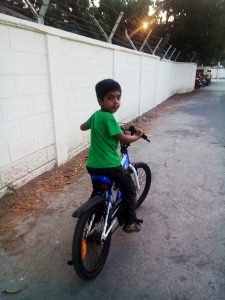 “Be like children in the kingdom of God,” said Christ.
“Be like children in the kingdom of God,” said Christ.
As a child, I always wondered what this saying meant—sometimes I still do—though I have heard a really meaningful explanation which goes like this:
A personality trait in adults, akin to that in children, which is: to have unconditional love, perennial joy, unshakeable faith in ones parents, strong spirit and a “Go get it!” feeling which can never be explained. In short, to have the heart of a child – strong and soft, at the same time.
Observe a child for even a short period of time. And anyone would know what that biblical phrase means. So, I did too.
A few months ago, I was so worried about my son, that he did not exhibit an interest in outdoor activities and that his bicycle was rusting away. And then, suddenly one day, he got this urge to ride his bicycle.
We helped him, ran behind the bike, he fell down a little bit. His best friend was with him constantly, who had already mastered the art. His grandfather was there too. And then his father. It was a big moment! Yes, it was.
And I saw all the stages with my own eyes. Trying to ride, balancing, joy, falling, pouting, getting-back-on, smiling, balancing, riding-joy, smiling, more riding-joy, riding-fast-joy, exhilaration-joy, racing-joy, controlled-riding-joy, showing off-joy, being-a-pro-joy, and so on …
These were all different stages of joy. There was no disappointment even in falling. There was not an iota of doubt that he could not master it. I marveled at the heart of a child. Yes, I was that too, once, long ago; a few decades ago. He never doubted his joy, he never doubted his ability to master it. As adults, we have regressed a long way.
I wondered, “where is that beautiful joy in me now?”
Yes, I am very happy in my life. And I am joyful now and then for many of life’s blessings. But why isn’t that joy, that zest for life, always there, 24/7, 365 days a year? I am not really sure, I guess “life happens” as they say.
So it made me wonder: “wouldn’t it be great if we all had that kind of childish joy always? Looking at the sky, filled with clouds, making out shapes, dragons and dinosaurs; licking an ice cream like a wild child; stopping to smell flowers; looking at a starry sky at night. Are these the things which give me joy?
Cuddling with my son; seeing him fulfill his aspirations; seeing him successful; seeing him joyful and happy and content. Is this what gives me joy as a mother?
“I wish I could show you, when you are lonely or in darkness, the astonishing light of your own being.”
~Hafiz of Persia
So what gives me joy? All of the above, and this too:
Bringing silence into my life, even when it is noisy and filled with all the activities of being a mother, a wife, a woman.
Acceptance, forgiveness, and being content with life, even while striving for my own personal sense of perfection.
Reconnecting to my own heart, my own inner self, seeking it in the stillness of my heart.
Will these bring me joy?
Being like a child, enjoying this beautiful journey of life, at the same time, not losing focus, and still loving, and accepting and trying, and being joyful all through!
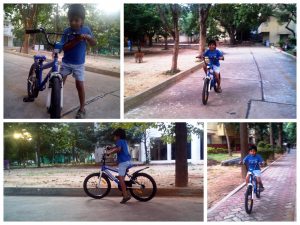
Oh be still, little heart… the wonders of a joyful heart! Stillness gives me joy!
What gives you joy? Has any simple life event helped you introspect, reconnect with your Higher Inner Self and brought back focus to your life?
This is an original post from our World Mom and Senior Editor in India, Purnima Ramakrishnan.
Her contributions to World Moms Blog can be found here. She also rambles at The Alchemist’s Blog.
Photo credit to the author.

by World Moms Blog | Apr 2, 2015 | 2015, Awareness, Being Thankful, Boys, Celebrations, Childhood, Culture, Guest Post, Health, Identity, India, Inspirational, Life, Life Lesson, Milestones, Motherhood, Priorities, Time, World Motherhood, Younger Children
 One moment everything seemed fine and the next I was creating a little puddle of tears on my Yogasana mat.
One moment everything seemed fine and the next I was creating a little puddle of tears on my Yogasana mat.
I emerged from the yogasana pose to find unexpected sobs bursting through my throat, catching me completely unawares. A little part of my mind wondered what this was all about. And then I realized this was probably because of a niggling dissonance within, a reaction to a new milestone in my son’s growth that had not yet been completely accepted or acknowledged. This is what had led to the sudden grey cloud near the heart, that burst through as tears.
This morning, as Abhishek, my son, was having his breakfast before leaving for school, he called out to me saying that there seemed to be a gap between his two lower incisors. I touched a tooth and immediately found it was loose. The milk tooth would soon fall. We grinned and Abhi told me about how Kirti, his school mate, already had two teeth missing. I thought of a couple of his other friends, senior to him by a year, wearing gap-toothed smiles with part-embarrassment, part -pride. Now he would be a part of that gang too.
As we waited at the bus-stop for his school bus, we talked of the concept of the tooth-fairy. We both agreed that the concept was “cute”. I bid him bye, returned home and resumed my morning chores.
But somewhere in the heart, deep, deep down, the unarticulated thought had arrived – our little baby is about to lose his baby teeth. How did the years fly by so fast? And that would have been the genesis of the tears.
The innocence and unsullied grace of childhood are truly magical and seem long-lasting. But the pace of change and growth can actually be so rapid, that the heart can seem overwhelmed. Scarcely does a new milestone–a habit, a skill, or a new activity–set in, than the “Finish” line for that zooms forward, and before one knows it, it is time to say goodbye to yet another phase of one’s child’s growing years.
So much to cherish and so little time! It seems like it was only yesterday that I was rhapsodizing over Abhishek’s four new, shiny little teeth and feeling nostalgic about toothless, gummy smiles. And now it’s time for those very teeth to go!
“So what?”, one may wonder. A purely practical approach to this whole thing would be that his physical growth is going on fine and that I ought to be feeling reassured!
But to me it seems to be much more than that. His shaky little tooth tells me a lot of things. It reminds me that he is growing up quickly and that the only mandate I have been given from the Universe is to give him love, pure and unadulterated, intense and in every moment. It shows me the passage of the seasons of time – the travails of toddler-hood have given way to heart-touchingly earnest attempts at responsibility for this sweet-yet-solemn almost-six-year-old.
But most of all, the tooth reminds me that “this too shall pass!”
So must change be heralded by tears? Not at all. Something tells me that some of the tears were tears of regret, for all those “Not now please, I am busy” moments, when I allowed temporary realities to hijack my energies away from the greater priority of sharing my time and care with him.
Those moments are irretrievable and all I can hope is that this tooth has taught me a valuable learning. And then there were a few tears of concerns: am I ready to guide him right as he reaches a new phase of growth? As ready as I will ever be, I guess.
And then there were tears of joy: my little one, darling creature of the Universe, is growing up.
Motherhood seems like a permanent stage of “Work in Progress”. There is no “Finished Product”, just a heart that smiles, cries, is pulled and stretched and learns to give some more.
This is an original guest post from Piya Mukherjee in Mumbai, India; Mother, Corporate Trainer, Director.
The image used in this post is attributed to Stephanie Sicore of Young@Art. It holds a Flickr Creative Commons attribution license.
World Moms Blog is an award winning website which writes from over 30 countries on the topics of motherhood, culture, human rights and social good. Over 70 international contributors share their stories from around the globe, bonded by the common thread of motherhood and wanting a better world for their children.
World Moms Blog was listed by Forbes Woman as one of the "Best 100 Websites for Women 2012 & 2013" and also called a "must read" by the NY Times Motherlode in 2013. Our Senior Editor in India, Purnima Ramakrishnan, was awarded the BlogHer International Activist Award in 2013.
More Posts

by Ecoziva (Brazil) | Mar 26, 2015 | 2015, Awareness, Being Thankful, Brazil, Environment, Family, Gardening, Gratefulness, Home, Inspirational, Kids, Life, Life Balance, Marriage, Motherhood, Moving, Nature, Parenting, Relocating, Stress, Weather, World Motherhood
 When we first married we lived in an apartment in the heart of a big metropolis. It was practical to live near everything we needed and be able to do all of our errands by foot or bus (in fact, we had no car and walked to work). However, we missed having green. We started looking for a house in a nice region on the outskirts of the metropolitan area, near a forest reservation.
When we first married we lived in an apartment in the heart of a big metropolis. It was practical to live near everything we needed and be able to do all of our errands by foot or bus (in fact, we had no car and walked to work). However, we missed having green. We started looking for a house in a nice region on the outskirts of the metropolitan area, near a forest reservation.
When we finally found a place we could afford to rent it wasn’t exactly your typical house. The owner had built two tiny guest houses in the back of a property he had initially planned to build a regular house in the front of later on; but that never happened.
On the upside we were living glued to a fragment of Atlantic rainforest and our son now had a huge garden to play in. On the downside, the house wasn’t exactly practical.
One of the guest houses had two rooms, a kitchen and a terrace. There we installed our son’s room and ours. However, the kitchen was so small it would only fit the fridge OR the stove, so we had to put the fridge in the second guesthouse and crossover all the time, sun or rain.
The second guesthouse, in turn, had a living room/terrace, one room (which became our library/office), the main bathroom and a pantry of sorts (we squeezed in the fridge instead). The roof had no lining, which wouldn’t be a problem if we didn’t have constant animal visitors coming in (lots of funny stories about that!).
Later on, when we were able to buy the our place, we decided to apply our limited funds to adapt the two guesthouses. An architect friend did his best to join them together into a single, more conventional house.
Our bedroom was expanded and incorporated the tiny kitchen and part of the terrace. A living room was built to join the two houses, which took the shape of a “J”. The main bathroom and former pantry gave place to the new kitchen. Part of the terrace became the laundry room. We lined the roof, installed mold-proof open wardrobes, and installed a large bathtub where our two other children were later to be born.
Nevertheless, all of this did not happen at one time. As I said, we had limited funds and every time these funds began to wane we had to stop.
At three different and stressful moments a lot of work was done in the house, including once, when during three very challenging months, we had to live at my mother-in-law’s.
Now, years later, we still live in a very unconventional house.
Besides the bedrooms, we never put in windowpanes or doors. The terrace/living room still opens completely into the forest – a curse and a blessing all at once! And even though our financial situation has improved considerably over the past few years, it has been four years since our last attempt at home improvement.
Aside from the occasional efforts to clean/fix the roof from the huge amount of leaves we get, we haven’t done much. Every time we think of all the stress involved we decide to postpone any kind of big project.
Despite everything, I love my house and its garden. I believe things will get better as our children grow older and we have more time and energy for housekeeping and improvement. My husband, on the other hand, thinks there is no way to make this house work and we should just move elsewhere, even though he also loves the closeness to the forest. The truth is he would like to live on a small farm, although I have safety concerns. Thus, every once in a while we go house or farm hunting.
Stay tuned! Part 2 coming soon…
How about you, what are your stories with house remodeling and moving? Please share below?
This is part 1 of a two part, original post to World Moms Blog from our contributor and mom of three in Brazil, Ecoziva.
The image used in this post is attributed to Karen Roe. It carries a Flickr Creative Commons attribution license.
Eco, from the greek oikos means home; Ziva has many meanings and roots, including Hebrew (brilliance, light), Slovenian (goddess of life) and Sanskrit (blessing). In Brazil, where EcoZiva has lived for most of her life, giving birth is often termed “giving the light”; thus, she thought, a mother is “home to light” during the nine months of pregnancy, and so the penname EcoZiva came to be for World Moms Blog.
Born in the USA in a multi-ethnic extended family, EcoZiva is married and the mother of two boys (aged 12 and three) and a five-year-old girl and a three yearboy. She is trained as a biologist and presently an university researcher/professor, but also a volunteer at the local environmental movement.
More Posts

by Jennifer Iacovelli | Mar 24, 2015 | 2015, Awareness, Kids, Social Good, Water, World Voice
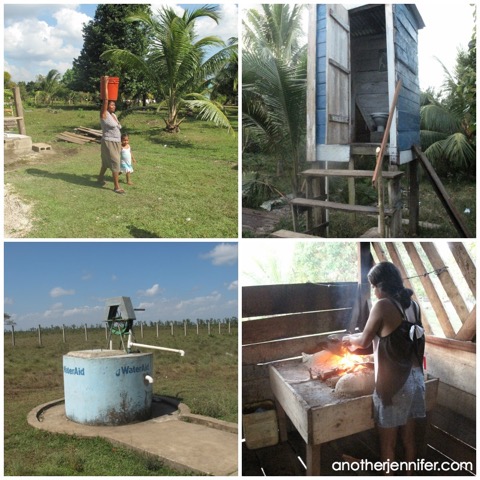 Sunday, March 22nd was World Water Day, a day to celebrate water and bring awareness to the fact that far too many people still lack access to safe water and toilets.
Sunday, March 22nd was World Water Day, a day to celebrate water and bring awareness to the fact that far too many people still lack access to safe water and toilets.
One in ten of the world’s population lives without safe drinking water and 40% do not have adequate sanitation. These statistics are staggering to me considering water is our most precious resource. Water is life. How could something so simple be so scarce for so many people on our planet?
I traveled to Nicaragua last year during World Water Day and spent a week with WaterAid America seeing their work on the ground in the remote indigenous communities there. It was a life-changing trip that taught me how much we take for granted here in the United States.
I got to spend time with a woman named Linda who opened up her house to me and my team. Linda’s home had no electricity or running water, yet she made us feel comfortable. We watched as she used the skills she learned from WaterAid to build and maintain wells for her community. These skills helped her earn money so she could buy her children basic things like shoes and books for school. She’s like any other mother, wanting to provide for her children first.
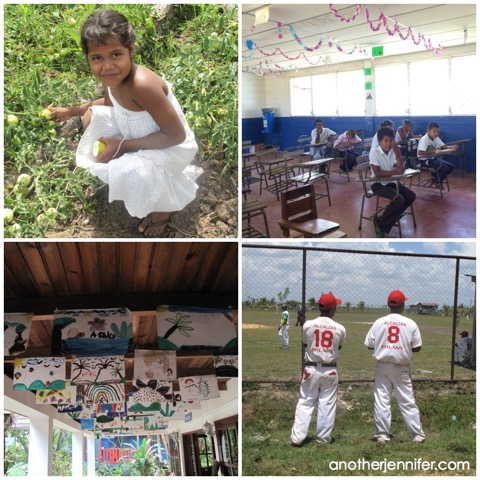
We slept under mosquito nets and ate food cooked over a fire with only the light of a headlamp once the sun went down. We used the toilet Linda built outside her home and dodged wandering farm animals as we walked. Linda took us to see where she keeps her crops via a dugout canoe. Her granddaughter, Exelia, collected vegetables and flowers in her dress, handing me some of my own every so often. We did not speak the same language, but we could communicate.
When I got back from my trip, I wrote about it on my blog and I talked about it a lot with my kids. I wanted them to understand that life in other countries does not always look and feel the same as ours. When I realized World Water Day was coming this year, I asked their teachers if I could come in and talk about the importance of water and toilets in our lives. They welcomed me with open arms.
My youngest is in kindergarten and my oldest is in fourth grade. To cut down on the inevitable giggles that might come from too much “potty talk,” I decided to take the simple approach of showing the kids photos from my trip. They reacted to the photos and asked lots of questions. I chose photos that showed the type of toilets, wells and catchment systems that were being built by the people of Nicaragua with the help of WaterAid America.
We talked about how diseases can spread if people don’t have a clean and sanitary place to go to the bathroom or if you don’t practice good hygiene. We talked about the need to build more wells and systems so that women and girls could spend their days working and going to school instead of walking for miles to fetch water. We talked about how unsafe water can make people very sick and how water filtration systems could help.
I also showed photos of kids in school and swimming, baseball players, toothbrushes and children’s artwork. We talked about how while the kids might live differently in Nicaragua, they were still very much like them. They laughed and played and enjoyed things like baseball and drawing. The fourth graders smartly wondered if they could use the wind, water and sun to help power the communities I had visited. They quickly understood that developing countries might not have enough money and resources to replicate what we have in America. In both classrooms, we talked about how if we know about the problems in the world and we already are living with solutions, we could share that knowledge with others and help.
Even elementary schools kids can be global citizens.
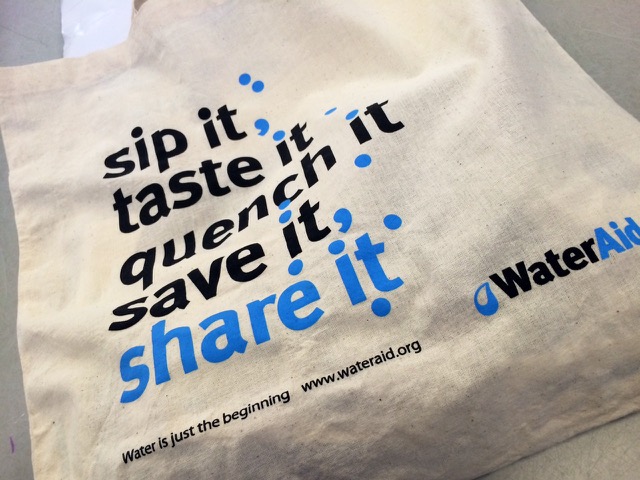
This is an original post written for World Moms Blog by Jennifer Iacovelli of Anotherjennifer.
Do you think your kids understand how precious our water resources are?
Jennifer Iacovelli is a writer, speaker and nonprofit professional. Based in Brunswick, Maine, she’s a proud single mom of two boys and one Siberian husky. Jennifer is the author of the Another Jennifer blog and creator of the Simple Giving Lab. Jennifer is also a contributing author of the book The Mother Of All Meltdowns. Her work has been featured on GOOD, BlogHer, USAID Impact, Feed the Future and the PSI Impact blog. Her latest book, Simple Giving: Easy Ways to Give Every Day, is available everywhere. Her passions are writing, philanthropy, her awesome kids and bacon, though not necessarily in that order.
More Posts

 I start my morning here in Japan the same way every day: by cleaning out the drain trap.
I start my morning here in Japan the same way every day: by cleaning out the drain trap.




















 Sunday, March 22nd was World Water Day, a day to celebrate water and bring awareness to the fact that far too many people still lack access to safe water and toilets.
Sunday, March 22nd was World Water Day, a day to celebrate water and bring awareness to the fact that far too many people still lack access to safe water and toilets.




